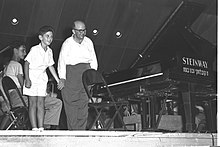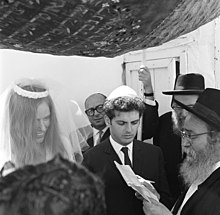Daniel Barenboim
Daniel Moses[2] Barenboim (Hebrew: דניאל בארנבוים; born 15 November 1942) is an Argentine-Israeli classical pianist and conductor based in Berlin, who also has Spanish and Palestinian citizenship.
[4] Barenboim previously served as music director of the Chicago Symphony Orchestra, the Orchestre de Paris and La Scala in Milan.
Both sons are part of the music world: David is a manager-writer for the German hip-hop band Level 8, and Michael Barenboim [de; he] is a classical violinist.
In June 1967, Barenboim and his then-fiancée Jacqueline du Pré gave concerts in Jerusalem, Tel Aviv, Haifa and Beersheba before and during the Six-Day War.
[18] His friendship with musicians Itzhak Perlman, Zubin Mehta, and Pinchas Zukerman, and marriage to du Pré led to the 1969 film by Christopher Nupen of their performance of the Schubert "Trout" Quintet.
In 1988, he was appointed artistic and musical director of the Opéra Bastille in Paris, scheduled to open in 1990, but was fired in January 1989 by the opera's chairman Pierre Bergé.
[26][27][28][29] In the autumn of 2006, Barenboim gave the Charles Eliot Norton Lectures at Harvard University, entitling his talk Sound and Thought.
[33] Barenboim made his conducting debut on 28 November 2008 at the Metropolitan Opera in New York for the House's 450th performance of Wagner's Tristan und Isolde.
At their invitation ten contemporary composers, among them Jörg Widmann, Olga Neuwirth and Matthias Pintscher, contributed new works engaging artistically with the COVID-19 pandemic.
In his recording of The Well-Tempered Clavier, Barenboim makes frequent use of the right-foot sustaining pedal, a device absent from the keyboard instruments of Bach's time (although the harpsichord was highly resonant), producing a sonority very different from the "dry" and often staccato sound favoured by Glenn Gould.
I think that concerning oneself purely with historic performance practice and the attempt to reproduce the sound of older styles of music-making is limiting and no indication of progress.
[63] In a conversation with Edward Said, Barenboim said that "Wagner, the person, is absolutely appalling, despicable, and, in a way, very difficult to put together with the music he wrote, which so often has exactly the opposite kind of feelings ... noble, generous, etc."
"Although Wagner died in 1883, he is not played [in Israel] because his music is too inextricably linked with Nazism, and so is too painful for those who suffered", Barenboim told a reporter.
[67] At the Israel Festival in Jerusalem in July 2001, Barenboim had scheduled to perform the first act of Die Walküre with three singers, including tenor Plácido Domingo.
In the end, a small number of attendees walked out and the overwhelming majority remained, applauding loudly after the performance of the Tristan und Isolde Prelude.
[78] Prior to receiving the $100,000 Wolf Prize, awarded annually in Israel, Barenboim said, "If people were really hurt, of course I regret this, because I don't want to harm anyone".
It is the same cell in the collective brain that does not allow them to make progress in their understanding of the needs of the Palestinian people", and also said that suicide bombings in Israel "had to be seen in the context of the historical development at which we have arrived".
[82] The speech caused controversy; the Jewish Telegraphic Agency wrote that Barenboim had "compared Herzl's ideas to Wagner's; criticized Palestinian terrorist attacks but also justified them; and said Israeli actions contributed to the rise of international anti-Semitism".
[85] In a 2012 interview with Der Spiegel,[86] Barenboim said, "It saddens me that official Israel so doggedly refuses to allow Wagner to be performed – as was the case, once again, at the University of Tel Aviv two weeks ago – because I see it as a symptom of a disease.
He also argued that after the trial of Adolf Eichmann and the Six-Day War, "a misunderstanding also arose ... namely that the Holocaust, from which the Jews' ultimate claim to Israel was derived, and the Palestinian problem had something to do with each other.
"[86] He also said, that: ...since the Six-Day War, Israeli politicians have repeatedly established a connection between European anti-Semitism and the fact that the Palestinians don't accept the founding of the State of Israel.
[91][92] This initiative brings together, every summer, a group of young classical musicians from Israel, Palestine and Arab countries to study, perform and to promote mutual reflection and understanding.
[99] In July 2012, Barenboim and the orchestra played a pivotal role at the BBC Proms, performing a cycle of Beethoven's nine symphonies, with the Ninth timed to coincide with the opening of the London 2012 Olympic Games.
Can the State of Israel allow itself an unrealistic dream of an ideological end to the conflict instead of pursuing a pragmatic, humanitarian one based on social justice?
[107] In December 2007, Barenboim and 20 musicians from Britain, the United States, France and Germany, and one Palestinian were scheduled to play a baroque music concert in Gaza.
[108] Barenboim commented: "A baroque music concert in a Roman Catholic church in Gaza – as we all know – has nothing to do with security and would bring so much joy to people who live there in great difficulty.
The parliamentary faction chairman of the Shas party demanded that Barenboim be stripped of his Israeli citizenship, but the Interior Minister told the media that "the matter is not even up for discussion".
[109] In January 2009, Barenboim cancelled two concerts of the West–Eastern Divan Orchestra in Qatar and Cairo "due to the escalating violence in Gaza and the resulting concerns for the musicians' safety".
The orchestra flew from Berlin to Vienna and from there to El Arish on a plane chartered by Barenboim, entering the Gaza Strip at the Egyptian Rafah Border Crossing.
[111] The concert, the first performance by an international classical ensemble in the Strip, was attended by an invited audience of several hundred schoolchildren and NGO workers, who greeted Barenboim with applause.





